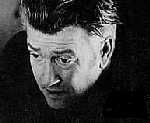Q Magazine, September 1997, written by Mark Kermode
Small men on the phone to themselves. Twins, who are in fact the same person. Lots of things catching fire. Uh-oh, looks like David Lynch has a new film out. "Ninety-six percent of the audience go with it," he informs Mark Kermode.
"Music is the keyword," says director David Lynch of his latest surreal magnum opus, Lost Highway. A dark and disturbing tale of one man's descent into paranoid delusion, the movie does indeed feature a killer musical soundtrack, including such appropriate delights as David Bowie's manic I'm Deranged. But Lynch is not talking about the film's soundtrack, he's talking about the structure of the film itself.
"Lately I feel films are more and more like music," he explains, running his hand through the impressively gravity defying hair that is two parts Elvis to one part Einstein. "Music deals with abstractions and, like film, it involves time. It has many different movements, it has much contrast. And through music you learn that, in order to get a particular beautiful feeling, you have to have started far back, arranging certain things in a certain way. You can't just cut to it."
This is about as straightforward as things get in Lynchworld, a world in which "people are a number seven, chairs are two or three and walls are like a one".
Described in the past as Jimmy Stewart from Mars, Lynch makes movies that you either get or you don't. There's little point in asking him about their meanings or intentions because he claims not to be good with words, although that doesn't stop him from tossing off the odd one-liner when in the mood. (Q "What would be a bad way to come out of the film?" A: "On a hospital gurney.")
Like the best music, Lynch's films defy ready linguistic description. "Imagine the length of a type written report that could honestly translate the feelings of a symphony into words," he speculates. "It would be pretty strange. It would really be like poetry," Anyone going into Lost Highway looking for a logical storyline will be sorely disappointed. In Lynchworld, characters don't obey the laws of narrative, they dance to the beat of a "psychotic fugue", rich with the tension and unease of a suspended chord.
"When you have a note, and another detuned note buzzes against it, there's something in between those two notes that's the magical area." he asserts. "It's a balance. And I think since we live in a world of dualities - hot and cold, high and low, the whole thing - that any balancing point is very special. It's not an intellectual thing, it's an intuitive thing. Many films are very good because you understand everything and you need to understand to get to where you have to go. And some films have parts that
are understandable, but, like in life, there are parts where your intuition is asked to join in, where you feel the truth of something. And it's different for each viewer."
Unsurprisingly, not everyone is in tune with Lynch's mode of film making. Most critics turned a deaf ear to his previous masterpiece, Twin Peaks: Fire Walk With Me, trampling the movie in a manner which colleague and composer Angelo Badalamenti likened to killing the director's child. "I love that film," he admits. "And I feel it was really strong. But fate can turn positive or negative, and it was a very strange time for me. A very negative thing."
Does a similar fate await Lost Highway? In the US, Lynch seized upon a negative review by stodgy critics Siskel and Ebert and plastered their "Two Thumbs Down" verdict across the film's advertising billboards by way of recommendation. In Europe the film opened to enthusiastic reviews; even in
Madrid, where it was previewed with some of the reels in the wrong order. "I heard about that," he laughs, "and it gives you an indication of how the human mind can work with pieces even when they' re out of order. How it seeks to make sense of something, and it makes it work somehow. It's a beautiful thing."
So is Lynch confident that the audience will be able to follow the music of his new film, considering how much Lost Highway ignores narrative conventions? "Ninety-six per cent of the audience go with it," he insists with typical precision, "but four percent will have a problem. For those people, the intellect has blocked the little area between nerves, the synapse. And the spark does not jump across. I don't know if there's any way of making the jump for them. Maybe more intellectual understanding would help . . "
He smiles and ruffles his anti-gravity quiff before adding. "Or some relaxation techniques." This quip sets him off laughing. And when he laughs, it sounds like electricity.





